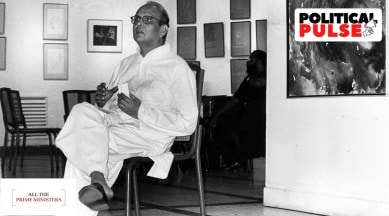Harikishan Sharma, Senior Assistant Editor at The Indian Express' National Bureau, specializes in reporting on governance, policy, and data. He covers the Prime Minister’s Office and pivotal central ministries, such as the Ministry of Agriculture & Farmers’ Welfare, Ministry of Cooperation, Ministry of Consumer Affairs, Food and Public Distribution, Ministry of Rural Development, and Ministry of Jal Shakti. His work primarily revolves around reporting and policy analysis. In addition to this, he authors a weekly column titled "STATE-ISTICALLY SPEAKING," which is prominently featured on The Indian Express website. In this column, he immerses readers in narratives deeply rooted in socio-economic, political, and electoral data, providing insightful perspectives on these critical aspects of governance and society. ... Read More
V P Singh, 8th Prime Minister who implemented Mandal panel report
Singh rose to the country's top post as a leader of the Janata Dal, which he founded in 1988. He began his political journey with the Congress party in late 1960s in Allahabad.

Prime Minister Narendra Modi, who has completed eight years in office, recently hinted that he was ready for a third term. Speaking virtually at a meeting in Bharuch where beneficiaries of various central government schemes were assembled, he said a “very senior” Opposition leader had once asked him what else was left for him to accomplish after becoming the PM twice. Modi said he would not rest till “100 per cent” coverage of government schemes was achieved in the country.
Modi, 71, is first PM so far to be born after Independence. In the course of over seven decades, the country has seen 15 Prime Ministers, over a journey marked with social, political and economic changes. The Indian Express looks at India’s parliamentary democracy through the tenures of its PMs.
*****
Vishwanath Pratap Singh served as the 8th Prime Minister of India. His brief prime ministerial tenure is notable for his landmark decision to implement the Mandal Commission report by extending 27 per cent reservation in government jobs to the Other Backward Classes (OBCs).
Singh took over as the PM on December 2, 1989, and remained in office till November 10, 1990, for a period of 343 days.
Born on June 25, 1931 at Allahabad, Singh was popularly known as “Raja of Manda” for being a scion of the erstwhile ruling family of Manda in Uttar Pradesh’s Fathepur.
Singh rose to the country’s top post as a leader of the Janata Dal, which he founded in 1988. He began his political journey with the Congress party in late 1960s in Allahabad. He became a member of the UP Assembly in 1969, when mid-term polls were held. However, two years later, he contested the parliamentary election and became a member of the fifth Lok Sabha from the Phulpur constituency, trouncing the Bharatiya Kranti Dal (BKD)’s candidate BD Singh by 66,780 votes.
In October 1974, Singh joined the Indira Gandhi government as a deputy minister in the commerce ministry. He served at the Centre till March 1977. As the Indira-led Congress dispensation was then defeated in the elections to the sixth Lok Sabha by the Janata Party, he too lost his election, beaten by the Bharatiya Lok Dal (BLD)’s Janeshwar Mishra in the Allahabad constituency.
Later, Singh made a comeback, winning the 1980 Lok Sabha election from Allahabad comfortably as he defeated the Janata Party (Secular)’s candidate Laxmi Bhushana Varshney. However, he soon resigned from the seventh Lok Sabha, to become the UP Chief Minister on June 9, 1980. He was elected as the member of the UP Legislative Council on November 21, 1980, but later contested a bypoll from the Tindwari Assembly constituency and became an MLA on June 14, 1981. He remained the UP CM till June 28, 1982.
In July 1983, he returned to national politics and was elected as a member of the Rajya Sabha. He joined the Indira Cabinet again as the commerce minister.
In the Rajiv Gandhi Cabinet, Singh held top portfolios like finance. In fact, when Gandhi took back the finance portfolio from him and gave him defence, Singh resigned in protest on April 12, 1987.
He was soon expelled from the Congress. Thereafter, he formed the Jan Morcha, a group of dissident Congress leaders. In October 1988, he founded the Janata Dal and launched a strident campaign against PM Rajiv over the Bofors scandal.
Buy Now | Our best subscription plan now has a special price
In the 1989 general elections, the Rajiv-led Congress suffered a debacle as its tally plummeted to 197 from 404 in 1984. With a haul of 143 seats, the Janata Dal emerged as the second largest party but it managed to form a government supported by the Left parties and the BJP from outside.
Sigh, who won from Fatehpur, was sworn in as the PM on December 2, 1989. Soon after taking the reins, on December 29, 1989, he announced on the floor of the Lok Sabha a ban on any future contracts for Bofors.
Singh’s biggest decision was, however, related to extending 27% reservation to OBCs. “I am happy today to announce in this august House a momentous decision of social justice that my government has taken regarding the socially and educationally backward classes on the basis of the report of the Mandal Commission,” he told the Lok Sabha on August 7, 1990.
The Second Backward Classes Commission was constituted under the chairmanship of BP Mandal on January 1, 1979. Though the Mandal panel had submitted its report on December 31, 1980, it was not implemented earlier.